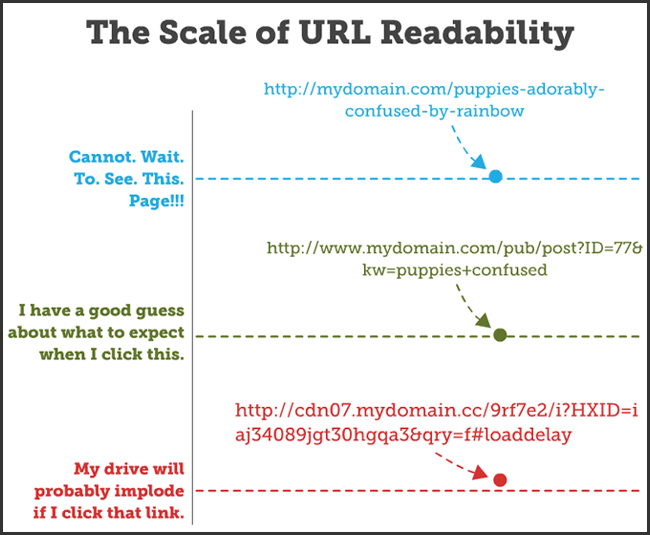What does Structured URLs for SEO means?
Google or any other search engion uses a crawler to index any website's web page, so when a user enter any search query , google bot searches all the indexed website's web pages with url.
Url like http://www.example.com/green-dress.html is known as well structed url than http://www.example.com/greendress.html, means structured url can be called as a url which is easy to understand for any user, or search engine crawler.
According to Google, a site's URL structure should be as simple as possible. Consider organizing your content so that URLs are constructed logically and in a manner that is most intelligible to humans (when possible, readable words rather than long ID numbers). For example, if you're searching for information about aviation, a URL like http://en.wikipedia.org/wiki/Aviation will help you decide whether to click that link. A URL like http://www.example.com/index.php?id_sezione=360&sid=3a5ebc944f41daa6f849f730f1, is much less appealing to users.
Few points to remember for structuring URLs :-
1.The more readable by human beings, the better
It should come as no surprise that the easier a URL is to read for humans, the better it is for search engines. Accessibility has always been a part of SEO, but never more so than today, when engines can leverage advanced user and usage data signals to determine what people are engaging with vs. not.
Readability can be a subjective topic, but hopefully this illustration can help:

Photo-Credit :- Moz.com
2. Length of URL:-
The length of the URL doesn’t matter to Google, as long as it doesn’t pass the http limit. And for the curious, the http limit is commonly recognized as 2083 characters, as Internet Explorer can’t handle URLs longer than that.
But try to keep it short & sweet.
3.Make Good Use of Keywords :-
Research has shown that people make decisions about the sites they click through based on the relevance of keywords present in the URL. Including pertinent keywords improves the likelihood they’ll choose your site among their options when you fill their need best.
When they encounter your link through social media, email, or a website, they’ll get a clearer picture of what your link offers. This can build enough trust and engagement that they click through.
In websites where your link is not included with anchor text, the URL itself becomes the anchor text. A readable, keyword-focused URL can drive traffic to your site by both boosting your rankings and encouraging click-throughs.
4. Canonicalize It :-
I promise it’s simpler than it sounds! Basically if you can get to the same page using multiple URLs, redirect the URLs to one specific location. Search engines will not show duplicates of the same site and will have to choose which one they like better. Instead of letting them decide, make the choice easy and redirect these links to the main index page.
5. Fewer folders is generally better :-
Take a URL like this:
randswhisky.com/scotch/lagavulin/15yr/distillers-edition/pedro-ximenez-cask/750ml
And consider, instead, structuring it like this:
randswhisky.com/scotch/lagavulin-distillers-edition-750ml
It's not that the slashes (aka folders) will necessarily harm performance, but it can create a perception of site depth for both engines and users, as well as making edits to the URL string considerably more complex (at least, in most CMS' protocols).
There's no hard and fast requirement—this is another one where it's important to use your best judgement.
6. Case sensitivity:-
When you your hosted a website on windows, it is not a problem, but if you are hosting your website on Linux/UNIX, you can get into trouble as they can interpret separate cases, and thus randswhisky.com/AbC could be a different piece of content from randswhisky.com/aBc.
7. Only Hyphens are preferred word separators :-
Google recommend's to use hyphens (-) instead of underscores (_) in your URLs, for better url structuring.
